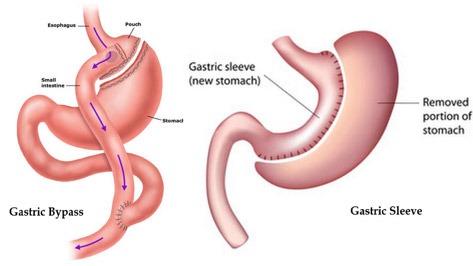Patient Resources
Required Vitamin and Mineral Supplement After Weight Loss Surgery
After a Roux-en-Y (gastric bypass) surgery or a sleeve gastrectomy (see figures below), you will be required to take supplements daily to meet your vitamin and mineral needs. Without the use of daily supplements, deficiencies have been seen in patients following this type of gastric surgery. The nutrients most affected are Iron, Vitamin B-12. Calcium and Vitamin D.
Listed below are required vitamin and mineral supplement. These supplement can be purchased over the counter at your local pharmacy or at the reception desk at our program. If you experience an intolerance to your supplements or are unable to locate supplements please contact your dietitian or your nurse for assistance.
All supplements need to be in chewable or liquid form for the first 6 weeks after surgery.

| Required Daily | Dosage per day | Suggested Schedule |
| Chewable Multivitamin | 200% of daily value | A.M. |
| Vitamin B-12 | 1,000 mcg | A.M. |
| Iron | 18-27mg | A.M. |
| Calcium Citrate with Vitamin D | 1,500-2,000 mg |
Divide dose into 600mg 3 times daily (afternoon, dinner and before bed) |
| Vitamin D3 | 2,000 IU* | P.M. |
| Optional | ||
|
Stool Softener (MiraLAX, MiraFIBER, BeneFiber, or Metamucil) |
As directed | Take with Iron dose |
| Biotin | 3,000-5,000mcg | A.M. |
*If you are not taking a weekly mega-dose of Vitamin D3 (50,000 IU)
Calcium Citrate with Vitamin D3:
- Take 1,800-2,400mg daily. Divide your dose of Calcium into 600mg 3 times per day; afternoon, dinner and before bed.
- Look for Calcium Citrate. This form of Calcium is better absorbed than other due to it does not require stomach acid to be absorbed.
- Calcium and Vitamin D supplements are important for maintaining healthy bones, help the hear pump correctly and repairing soft tissue.
- INTERACTIONS: Caffeinated products, spinach and whole grain products may decrease absorption.
- Be sure to talk calcium 1-2 hours before or after taking your Iron supplement. Calcium will decrease the absorption of Iron.
Vitamin D3:
- Take 2,000 IU daily, if you ARE NOT taking a weekly mega-dose of Vitamin D3 (50,000IU)
- Vitamin D3 help the body absorb calcium and phosphorus, minerals needed for proper growth and development of bones and teeth.
- Finding a supplement containing Vitamin D is important because we do not readily absorb Vitamin D from the sun in the northern United States.
Why do I need to take the required supplements?
Multivitamin:
- Your intake will be significantly decreased, taking a daily multivitamin will help ensure you are meeting your body’s needs for micronutrients.
- Choose a chewable, chalky version, NOT a gummy version.
Vitamin B-12:
- Take 1,000 mcg per day, sublingual or dissolvable for 6 weeks, then to a pill form.
- You may be prescribed monthly B-12 shots by your surgeon.
- B-12 is important in red blood cell and nerve function, digestion and absorption of food and protein synthesis.
- Vitamin B-12 deficiency can cause some types of anemia.
Iron:
- Take 18mg of iron daily in addition to the iron found in your multivitamin
- Iron should be in any of the following forms: Ferrous Fumarate, Ferrous Gluconate, or Ferrous Sulfate.
- Iron is vital in the formation of red blood cells, which provide oxygen to the entire body.
- INTERACTIONS: You should avoid taking Iron with your Calcium supplement, Antacids, or with the following foods: dairy products, eggs, spinach, whole grain breads or cereal, tea or coffee. These foods can decrease the amount of iron your body will absorb.
- Take Iron 1-2 hours after or before taking a Calcium supplement.
- Iron can cause constipation, diarrhea or abdominal discomfort.
Calcium Citrate with Vitamin D3:
- Take 1,800-2,400mg daily. Divide your dose of Calcium into 600mg 3 times per day; afternoon, dinner and before bed.
- Look for Calcium Citrate. This form of Calcium is better absorbed than other due to it does not require stomach acid to be absorbed.
- Calcium and Vitamin D supplements are important for maintaining healthy bones, help the hear pump correctly and repairing soft tissue.
- INTERACTIONS: Caffeinated products, spinach and whole grain products may decrease absorption.
- Be sure to talk calcium 1-2 hours before or after taking your Iron supplement. Calcium will decrease the absorption of Iron.
Vitamin D3:
- Take 2,000 IU daily, if you ARE NOT taking a weekly mega-dose of Vitamin D3 (50,000IU)
- Vitamin D3 help the body absorb calcium and phosphorus, minerals needed for proper growth and development of bones and teeth.
- Finding a supplement containing Vitamin D is important because we do not readily absorb Vitamin D from the sun in the northern United States.
Why should I take the optional supplements?
Stool Softener:
- Take to manage constipation daily or every their day. Only take if needed.
Biotin:
- Can be taken before or after your weight loss surgery to prevent or reduce hair loss.
Refrences:
Aills L. et al. ASMBS Allied Health Nutrition Guidelines for the Surgical Weight Loss Patient. Surg Obes Relat Dis. 2008;4(5 suppl):S73-108.
Mechanick, et al. AACE/TOS/ASMBS Guidelines: Clinical practice guidelines for the perioperative nutritional, metabolic, and nonsurgical support of the bariatric surgery patient – 2013 Update: cosponsored by American Association of Clinical Endocrinologist, the Obesity Society, and American Society for Metabolic and Bariatric Surgery. Surg Obes Relat Dis. 2013;;9(2):159-191
Bariatric store
Bingham Memorial Weight loss center will now have chewable multivitamin, Iron chews, Vitamin D3 and Biotin available for purchase at our Blackfoot clinic. We will also have a variety of protein powders from Bariatric Fusion. If you live outside of Blackfoot you can preorder your supplements or protein powders by calling Michelle at 208.782.3993 and a member of our team will drop them off at our clinics in Pocatello and Idaho Falls on our next clinic day.
LIVER SHRINKING DIET
Start date must be 2 weeks prior to procedure.
Guidelines:
- Use measuring cups, Use a food scale that measures ounces for meats/proteins.
- Continue taking all vitamin and mineral supplements prescribe by your Physician or Surgeon.
- Completely eliminate carbonated beverages from your diet.
- Get plenty to drink during the day. Drink 64 ounces of non-calorie (15 calories or less per serving), non-carbonated beverages each day. Non-carbonated, non-calorie beverages can include: Crystal light, water, diet tea drinks, diet sports drinks, diet flavored water or some other calorie free drink. NO diet sodas (no carbonation allowed).
- Start eating “dry” meals. Stop drinking fluids 30 minutes before eating and do not drink anything for 30-45 minutes after you eat. “Dry meals” are how you will have to eat after the procedure, so it would be a good idea to start practicing now.
Note: Expected weight loss is 10-15 pounds or as specified by physician.
This diet should be followed for 2 weeks. It is a medical diet to shrink your liver.
If you have questions, call program dietitian at 782-3722.
Daily Meal Pattern
1st Meal
1 protein choice
1 fruit choice
1 dairy choice
2nd Meal
1 protein choice
2 vegetable choices (this equals 2 cups veggies)
3rd Meal
1 protein choice
2 vegetable choices (this equals 2 cups veggies)
Daily Totals: Calories= approx. 700-800. Carbohydrates =40-50.




